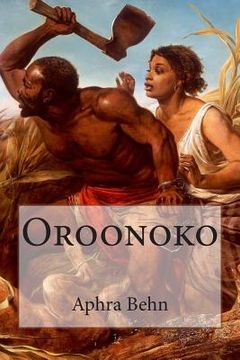Reseña del libro "Oroonoko (en Inglés)"
Oroonoko: or, the Royal Slave is a short work of prose fiction by Aphra Behn (1640-1689), published in 1688 by William Canning and reissued with two other fictions later that year. The eponymous hero is an African prince from Coramantien who is tricked into slavery and sold to British colonists in Surinam where he meets the narrator. Behn's text is a first person account of his life, love, rebellion, and execution. Behn, often cited as the first known professional female writer, was a successful playwright, poet, translator and essayist. She began writing prose fiction in the 1680s, probably in response to the consolidation of theatres that led to a reduced need for new plays. Published less than a year before she died, Oroonoko is sometimes described as one of the earliest English novels. Interest in it has increased since the 1970s, with critics arguing that Behn is the foremother of British women writers, and that Oroonoko is a crucial text in the history of the novel. Oroonoko is now the most studied of Aphra Behn's novels, but it was not immediately successful in her own lifetime. It sold well, but the adaptation for the stage by Thomas Southerne (see below) made the story as popular as it became. Soon after her death, the novel began to be read again, and from that time onward the factual claims made by the novel's narrator, and the factuality of the whole plot of the novel, have been accepted and questioned with greater and lesser credulity. Because Mrs. Behn was not available to correct or confirm any information, early biographers assumed the first-person narrator was Aphra Behn speaking for herself and incorporated the novel's claims into their accounts of her life. It is important, however, to recognise that Oroonoko is a work of fiction and that its first-person narrator-the protagonist-need be no more factual than Jonathan Swift's first-person narrator, ostensibly Gulliver, in Gulliver's Travels, Daniel Defoe's shipwrecked narrator in Robinson Crusoe, or the first-person narrator of A Tale of a Tub. Researchers today cannot say whether or not the narrator of Oroonoko represents Aphra Behn and, if so, tells the truth. Scholars have argued for over a century about whether or not Behn even visited Surinam and, if so, when. On the one hand, the narrator reports that she "saw" sheep in the colony, when the settlement had to import meat from Virginia, as sheep, in particular, could not survive there. Also, as Ernest Bernbaum argues in "Mrs. Behn's 'Oroonoko'", everything substantive in Oroonoko could have come from accounts by William Byam and George Warren that were circulating in London in the 1660s. However, as J.A. Ramsaran and Bernard Dhuiq catalogue, Behn provides a great deal of precise local color and physical description of the colony. Topographical and cultural verisimilitude were not a criterion for readers of novels and plays in Behn's day any more than in Thomas Kyd's, and Behn generally did not bother with attempting to be accurate in her locations in other stories. Her plays have quite indistinct settings, and she rarely spends time with topographical description in her stories. Secondly, all the Europeans mentioned in Oroonoko were really present in Surinam in the 1660s. It is interesting, if the entire account is fictional and based on reportage, that Behn takes no liberties of invention to create European settlers she might need. Finally, the characterisation of the real-life people in the novel does follow Behn's own politics. Behn was a lifelong and militant royalist, and her fictions are quite consistent in portraying virtuous royalists and put-upon nobles who are opposed by petty and evil republicans/Parliamentarians. Had Behn not known the individuals she fictionalises in Oroonoko, it is extremely unlikely that any of the real royalists would have become fictional villains or any of the real republicans fictional heroes.

